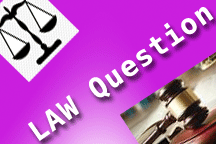Law Clerk Model Question - Download the Session Judge Court Summer Law Clerk Previous Papers to sharpen your skills in various sections. Definitely, using the last year Session Judge Court Clerk question papers with answers Pdf, you can practice well for the exam and result will be also good. Hope, you all applied for District Court Exam and looking for Previous Years Question Papers of Law Clerk.

That’s why we have provided District Court Judicial Law Clerk Previous Papers along with Answers. Applicants can download High Court Law Clerk Solved Question Papers and start preparation. Why Late! It already announced the NCDRC Law Clerk Exam date. So, hurry up guys!!! You have less time for the preparation. At first, refer and download Supreme Court of India Legal Clerk Syllabus & Exam Pattern. Then, download the Session Judge Court Common Law Clerk Model Question Papers. You can use these Session Judge Court Corporate Law Clerk Old Papers as a reference for your practice.
1. The Fundamental Rights secured to the individual are
(a) Limited to the State action only
(b) Meant to protect persons against the conduct of private persons
(c) Meant to protect persons against the police action
(d) All of the above are true
2. The expression ‘every person’ in Article 5 includes
(a) A prisoner
(b) Member of armed force
(c) Person living within the territory of India
(d) All of the above are true
3. Right to freedom of religion cannot be restricted on the ground of
(a) Public order
(b) Security of State
(c) Health
(d) Morality
4. In which of the following cases, it was observed that Article 14, 19 and 21 are not mutually exclusive and they jointly aim at reasonableness and fairness
(a) Ram Swarup v. Delhi Administration
(b) Jagan Nath v. UOI
(c) Golak Nath v. State of Punjab
(d) Maneka Gandhi v. UOI
5. It has been said in many cases viz., Devdasan v. UOI, that Article 16 should be read with
(a) Article 45 and 332
(b) Article 46 and 335
(c) Article 15 and 332
(d) Article 46 and 332
6. Right to travel abroad is a part of ‘personal liberty’ as envisaged under Article 21
(a) The statement is true
(b) The statement is incorrect
(c) The right to travel abroad is person’s personal liberty but within the procedure established by law
(d) This article deals with personal liberty in India only and not for the travel abroad
7. Article 30(2) lays down that there cannot be any discrimination in giving aid to educational institution on the ground of
(a) Institution is being managed by the minority
(b) Institution is managed by the religious or linguistic minority
(c) Institution is managed by religious, cultural and linguistic minority
(d) Institution is managed by cultural, religious, linguistic minority or majority
8. The expression ‘minority’ in Article 30 means any community which is
(a) Less than 50% of the population of a particular State as a whole
(b) 40% of the population of a particular State as a whole
(c) It is determined on the basis of the entire population of the country
(d) None of these
9. According to Article 22(4) no detention of any person is possible without the intercession of the Advisory Board for a period of
(a) Three months
(b) Two months
(c) Twelve months
(d) Less than two months
10. In case of A.K. Gopalan v. State of Madras, the Preventing Detention Act, 1950 was found conflicting with the two Articles
(a) Articles 14 and 17
(b) Articles 19 and 21
(c) Articles 23 and 25
(d) Articles 23 and 32
11. The Right to Property was dropped from the list of Fundamental Rights by the
(a) 24th Amendment
(b) 42nd Amendment
(c) 44th Amendment
(d) None of these
12. The Directive Principles are aimed at
(a) Securing political freedom
(b) Securing social and economic freedom by appropriate action
(c) Executive supremacy
(d) Judicial supremacy
13. The term ‘State’ in connection with the Directive Principles
(a) Has a meaning given to it in reference to Fundamental Rights
(b) Means only Union and State Legislature
(c) Means all three organs of the Government
(d) Means the same thing as in connection with the Fundamental Rights
14. Power of Governor to grant pardon etc., and to suspend, remit or commute sentence in certain cases is a statutory power. It is given in
(a) Article 159
(b) Article 161
(c) Article 162
(d) Article 163
15. The quorum to constitute a meeting of the House of Parliament shall be
(a) 1/10th of total number of members
(b) 2/3rd of total number of members
(c) 1/3rd of total number of member
(d) None of these
16. Total strength of Lok Sabha members is
(a) 542
(b) 525 from the State and 20 from Union Territories
(c) 525 from the States and 20 from Union Territories and 2 nominated by President from Union Territory
(d) 555
17. The provision of Article 368 of the Constitution of India, as it stands today deals with
(a) Power of Parliament to amend the Constitution
(b) Procedure for amendment of the Constitution to be followed by the Parliament
(c) Power as well as procedure for amendment of the Constitution
(d) Passing the ratification of Amendment Bills by State Legislature
18. The Supreme Court of India
(a) Is a Court of record and has power to punish for its contempt
(b) Is only highest Court of Appeal
(c) Is like House of Lords on its Judicial side
(d) Is in all respects like Supreme Court of USA
19. The voting age has been reduced from 21 to 18 by the Parliament in the year
(a) 1976
(b) 1978
(c) 1989
(d) 1991
20. The Ninth Schedule to the Indian Constitution was added by:
(a) First Amendment
(b) Eighth Amendment
(c) Ninth Amendment
(d) Forty-Second Amendment

No comments:
Post a Comment